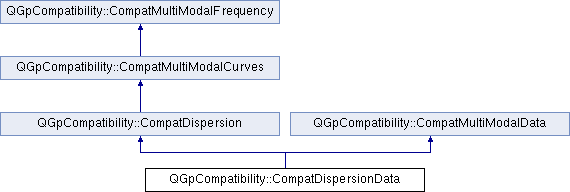
#include <CompatDispersionData.h>

Public Member Functions | |
| double | closestModeMisfit (bool strictModeJumping, FILE *flog) |
| CompatDispersionData () | |
| default constructor | |
| CompatDispersionData (int modesCount, int omegasCount) | |
| Allocates an empty structure. | |
| CompatDispersionData (const CompatDispersionData *o, int modesCount) | |
| Allocates an empty structure based on an existing one with another number of modes. | |
| CompatDispersionData (const CompatMultiModalCurves *o) | |
| Set the values o as the measurements. | |
| void | convertStddev () |
| Export in a file readable by Herrmann SURF. | |
| ModalCurve | curve (int iMode) |
| QVector< double > * | groupSlowness (int iMode) |
| double | maxDataFrequency () |
| double | minDataFrequency () |
| double | misfit (int iMin, int iMax, FILE *flog) |
| double | misfit (FILE *flog) |
| Calculate the Root Mean Square for the current calculated dispersion curve. | |
| void | valuesToData () |
| void | valuesToData (CompatMultiModalCurves *o) |
default constructor
: CompatDispersion(), CompatMultiModalData() {}
| QGpCompatibility::CompatDispersionData::CompatDispersionData | ( | int | modesCount, |
| int | omegasCount | ||
| ) | [inline] |
Allocates an empty structure.
| QGpCompatibility::CompatDispersionData::CompatDispersionData | ( | const CompatDispersionData * | o, |
| int | modesCount | ||
| ) | [inline] |
Allocates an empty structure based on an existing one with another number of modes.
:
CompatDispersion(o, modesCount),
CompatMultiModalData(o, modesCount,0) {}
| QGpCompatibility::CompatDispersionData::CompatDispersionData | ( | const CompatMultiModalCurves * | o | ) | [inline] |
Set the values o as the measurements.
:
CompatDispersion(o),
CompatMultiModalData(o) {}
| double QGpCompatibility::CompatDispersionData::closestModeMisfit | ( | bool | strictModeJumping, |
| FILE * | flog | ||
| ) |
Calculate the Root Mean Square for the current calculated dispersion curve using the mode that matches best the the data fundamental curve (taken as the effictive apparent velocity)
References QGpCompatibility::CompatMultiModalData::_measurements, QGpCompatibility::CompatMultiModalFrequency::_modesCount, QGpCompatibility::CompatMultiModalFrequency::_omegasCount, QGpCompatibility::CompatMultiModalData::_omegasCount, QGpCompatibility::CompatMultiModalData::_stddev, QGpCompatibility::CompatMultiModalCurves::_values, QGpCompatibility::CompatMultiModalData::measurements(), mode, QGpCoreTools::sqrt(), QGpCompatibility::CompatMultiModalData::stddev(), and TRACE.
{
TRACE;
// RMS is the calculated with the closest mode
double rms_val=0;
int omegaCountReal=CompatMultiModalFrequency::_omegasCount;
int omegaCountData=omegaCountReal;
// Effective apparent velocity is always in mode 0 (fundamental)
double * measurements=_measurements[0];
double * stddev=_stddev[0];
int maxMode=CompatMultiModalFrequency::_modesCount-1;
for(int i=CompatMultiModalFrequency::_omegasCount-1;i>=0;i--) {
if(measurements[i]!=0) {
double diff,minDiff=1e99;
int nextSampleMaxMode=maxMode;
for(int mode=0;mode<=maxMode;mode++) {
if(_values[mode][i]!=0) {
#ifdef SLOWNESS_MISFIT
if(stddev[i]) diff=(measurements[i]-_values[mode][i]) /stddev[i];
else diff=(measurements[i]-_values[mode][i]) /measurements[i];
#else
if(stddev[i]) diff=(1/measurements[i]-1/_values[mode][i])*stddev[i];
else diff=(1/measurements[i]-1/_values[mode][i])*measurements[i];
#endif
if(diff<0) diff=-diff;
if(diff<minDiff) {
minDiff=diff;
nextSampleMaxMode=mode;
}
}
}
if(strictModeJumping) maxMode=nextSampleMaxMode;
if(minDiff!=1e99) rms_val+=minDiff*minDiff; else omegaCountReal--;
}
else {omegaCountData--;omegaCountReal--;}
}
if(omegaCountReal>0)
rms_val=sqrt(rms_val/omegaCountReal)*(1+omegaCountData-omegaCountReal);
else {
fprintf(flog," *** ERROR *** : no common value between calculated and data, this should never happen!\n");
rms_val=10000;
}
return rms_val;
}
Export in a file readable by Herrmann SURF.
the measurements are read from a file of the Herrmann disp.d format: 1st line : IUNIT (not used here) IFRPER (0 if period, 1 if frequency) Other lines: ILVRY (1=Love,2=Rayleigh) IPORG(unused) IMODE FRPER VAL DVAL(unused)
The way the stddev is stored has changed from the inverse of velocity stddev to the stddev of the slowness. new_stddev=old_stddev*slowness*slowness All reports with version 0 have the old format for stddev This routine is called be CompatInversionReport to change the stddev in case of version 0
References QGpCompatibility::CompatMultiModalData::_measurements, QGpCompatibility::CompatMultiModalData::_modesCount, QGpCompatibility::CompatMultiModalData::_omegasCount, QGpCompatibility::CompatMultiModalData::_stddev, QGpCompatibility::CompatMultiModalData::measurements(), mode, QGpCompatibility::CompatMultiModalData::stddev(), and TRACE.
Referenced by QGpCompatibility::CompatInversionReport::loadDispersionGoal().
{
TRACE;
for(int mode=0;mode<CompatMultiModalFrequency::_modesCount;mode++) {
double * measurements=_measurements[mode];
double * stddev=_stddev[mode];
for(int i=0;i<CompatMultiModalFrequency::_omegasCount;i++)
stddev[i]=measurements[i]*measurements[i]/stddev[i];
}
}
| ModalCurve QGpCompatibility::CompatDispersionData::curve | ( | int | iMode | ) |
Reimplemented from QGpCompatibility::CompatMultiModalData.
References QGpCompatibility::CompatMultiModalFrequency::_omegas, QGpCompatibility::CompatMultiModalData::_omegasCount, and TRACE.
{
TRACE;
ModalCurve c=CompatMultiModalData::curve(iMode);
int n=CompatMultiModalFrequency::_omegasCount;
for(int i=0;i<n;i++) {
c[i].setX(_omegas[i]);
}
return c;
}
| QVector< double > * QGpCompatibility::CompatDispersionData::groupSlowness | ( | int | iMode | ) |
References QGpCompatibility::CompatMultiModalData::_measurements, and QGpCompatibility::CompatMultiModalFrequency::_omegas.
{
ASSERT(iMode<CompatMultiModalFrequency::_modesCount);
QVector<double> * list=new QVector<double>;
double * values=_measurements[iMode];
int n=CompatMultiModalFrequency::_omegasCount-1;
for(int i=1;i<n;i++) {
double derslow=0.5*((values[i]-values[i-1])/(_omegas[i]-_omegas[i-1])+
(values[i+1]-values[i])/(_omegas[i+1]-_omegas[i]));
derslow*=_omegas[i];
list->push_back(values[i]+derslow);
}
return list;
}
References QGpCompatibility::CompatMultiModalData::_measurements, QGpCompatibility::CompatMultiModalData::_modesCount, QGpCompatibility::CompatMultiModalFrequency::_omegas, mode, TRACE, and twopi.
{
TRACE;
double maxFreq=0;
for(int mode=0; mode<CompatMultiModalFrequency::_modesCount;mode++) {
double * measurements=_measurements[mode];
for(int i=CompatMultiModalFrequency::_omegasCount-1;i>=0;i--) {
if(measurements[i]!=0) {
if(_omegas[i]>maxFreq) maxFreq=_omegas[i];
break;
}
}
}
return maxFreq/twopi;
}
References QGpCompatibility::CompatMultiModalData::_measurements, QGpCompatibility::CompatMultiModalData::_modesCount, QGpCompatibility::CompatMultiModalFrequency::_omegas, QGpCompatibility::CompatMultiModalData::_omegasCount, mode, TRACE, and twopi.
{
TRACE;
double minFreq=1e99;
for(int mode=0; mode<CompatMultiModalFrequency::_modesCount;mode++) {
double * measurements=_measurements[mode];
for(int i=0;i<CompatMultiModalFrequency::_omegasCount;i++) {
if(measurements[i]!=0) {
if(_omegas[i]<minFreq) minFreq=_omegas[i];
break;
}
}
}
return minFreq/twopi;
}
| double QGpCompatibility::CompatDispersionData::misfit | ( | int | iMin, |
| int | iMax, | ||
| FILE * | flog | ||
| ) |
Calculate the Root Mean Square for the current calculated dispersion curve between indexes iMin and iMax
References QGpCompatibility::CompatMultiModalData::_measurements, QGpCompatibility::CompatMultiModalFrequency::_modesCount, QGpCompatibility::CompatMultiModalData::_modesCount, QGpCompatibility::CompatMultiModalData::_stddev, QGpCompatibility::CompatMultiModalCurves::_values, QGpCompatibility::CompatMultiModalData::measurements(), mode, QGpCoreTools::sqrt(), QGpCompatibility::CompatMultiModalData::stddev(), and TRACE.
{
TRACE;
// Global RMS is the sum of the RMS of all modes
double rms_val=0;
int omegaCountReal=(iMax-iMin+1)*CompatMultiModalFrequency::_modesCount;
int omegaCountData=omegaCountReal;
for(int mode=0;mode<CompatMultiModalFrequency::_modesCount;mode++) {
double * measurements=_measurements[mode];
double * stddev=_stddev[mode];
double * calculated=_values[mode];
for(int i=iMin;i<=iMax;i++) {
if(measurements[i]!=0) {
if(calculated[i]!=0) {
double diff;
#ifdef SLOWNESS_MISFIT
if(stddev[i]) diff=(measurements[i]-calculated[i]) /stddev[i];
else diff=(measurements[i]-calculated[i]) /measurements[i];
#else
if(stddev[i]) diff=(1/measurements[i]-1/calculated[i])*stddev[i];
else diff=(1/measurements[i]-1/calculated[i])*measurements[i];
#endif
rms_val+=diff*diff;
} else omegaCountReal--;
} else {omegaCountData--;omegaCountReal--;}
}
}
if(omegaCountReal>0)
rms_val=sqrt(rms_val/omegaCountReal)*(1+omegaCountData-omegaCountReal);
else if(omegaCountData==0) rms_val=0;
else {
fprintf(flog," *** ERROR *** : no common value between calculated and data, this should never happen!\n");
rms_val=10000;
}
return rms_val;
}
| double QGpCompatibility::CompatDispersionData::misfit | ( | FILE * | flog | ) | [inline] |
Calculate the Root Mean Square for the current calculated dispersion curve.
References QGpCompatibility::CompatMultiModalFrequency::_omegasCount, and misfit().
{
return misfit(0,CompatMultiModalFrequency::_omegasCount-1,flog);
}
| void QGpCompatibility::CompatDispersionData::valuesToData | ( | ) | [inline] |
References QGpCompatibility::CompatMultiModalData::valuesToData().
{CompatMultiModalData::valuesToData(this);}
| void QGpCompatibility::CompatDispersionData::valuesToData | ( | CompatMultiModalCurves * | o | ) | [inline] |
Reimplemented from QGpCompatibility::CompatMultiModalData.
References QGpCompatibility::CompatMultiModalData::valuesToData().